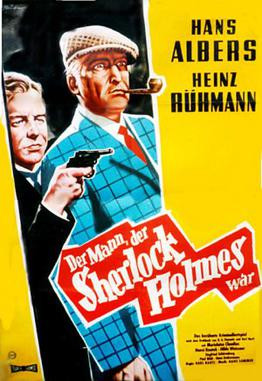| Reviews & Columns |
|
Reviews DVD TV on DVD Blu-ray 4K UHD International DVDs In Theaters Reviews by Studio Video Games Features Collector Series DVDs Easter Egg Database Interviews DVD Talk Radio Feature Articles Columns Anime Talk DVD Savant Horror DVDs The M.O.D. Squad Art House HD Talk Silent DVD
|
DVD Talk Forum |
|
|
| Resources |
|
DVD Price Search Customer Service #'s RCE Info Links |
|
Columns
|
|
|
Man Who Was Sherlock Holmes, The
Morris Flint (Hans Albers) and Macky McPherson (Heinz Rühmann) are genial, roguish conmen masquerading as Sherlock Holmes and Dr. John Watson, respectively. They seem primarily interested in lavish train and hotel accommodations that their "celebrity status" affords them, rather than actively bilking others of their fortunes. Flint, rather than McPherson, is primarily behind the impersonation, with "Dr. Watson" worrying constantly about being discovered. In this sense, these characters are virtually identical to those found in the later, sadly forgotten American television sitcom called Colonel Humphrey Flack (1953-59), which starred Alan Mowbray and Frank Jenks.
The story has the pair investigating a complex plot to steal four priceless stamps and replace them with counterfeits. Femme fatale Madame Ganymare (Hilde Weissner) is behind the elaborate scheme, while two attractive young sisters, Mary (Marieluise Claudius) and Jane Berry (Hansi Knoteck) are innocently connected, they travelling to inherit a large estate from a distant relative, whose mansion is actually the headquarters of the ingenious counterfeiter.
Much of the plot (and comedy) revolves around how, merely by dressing like Sherlock Holmes and carrying around a violin case, Flint effortlessly convinces everyone from the local police to the management of a ritzy hotel that he is Holmes, even when he insists he's actually Morris Flint.
The movie apparently is set around 1910: the leading players where period-appropriate costumes and the German equivalent of horse-drawn hansom cabs are used, but the movie doesn't hide mid-1930s automobiles frequently visible in the background. The last Sherlock Holmes stories by Arthur Conan Doyle were published around 1927 (Doyle himself died in 1930), so Holmes was still a nearly-contemporary character in 1938 Germany. Further, as the stories operated from the pretense that Dr. Watson, not Doyle, was documenting accounts of Holmes's greatest case, many readers wrongly assumed Holmes and Watson were real people, not fictitious creations. So it's not too much of a stretch to imagine hotel managers and house detectives fawning over these impersonators.
The movie itself is obviously an A-picture production that compares favorably to Hollywood films of the same period. There are several lavish sets, the leads were all big stars, and there's even a couple of fairly delightful musical numbers. Star Hans Albers doesn't remotely resemble the Sherlock Holmes of the Sidney Paget illustrations. With his blonde hair, piercing blue eyes and bearing he comes off rather like a young Lionel Atwill, though his screen persona, at least here, is more along the lines of William Powell.
Hans Albers was the top male star in Germany from 1930-1945, yet had a Jewish girlfriend, Hansi Burg, whom he eventually moved first to Switzerland and finally Great Britain (in 1939). Unlike, say, actress-director Leni Riefenstahl, he assiduously avoided any public association with Nazism and apparently avoided appearing in propagandistic films. Amazingly, the Nazis turned a blind eye to Albers's relationship with Burg, and did not compel him to publicly endorse Hitler or the Party. One can only surmise that his popularity was so enormous that to upset the actor wasn't worth the bad press that might have resulted. After the war his association with wartime cinema damaged his career somewhat, though he continued working until his death in 1960.
Heinz Rühmann is equally good as the Dr. Watson character, Rühmann specializing in these sorts of regular guy-type roles before turning to character parts later in life. He remained active until 1993, the year before his death, at 92. His only English-speaking part was in Stanley Kramer's Ship of Fools (1965). The film's Mary and Jane, Marieluise Claudius and Hansi Knoteck, had contrasting careers, Claudius (the blonde one) dying of heart failure in 1941 at just 29 years old, while Knoteck (the brunette) had a long career stretching until at least 1974. She died in 2013 at nearly 99.
In some ways, The Man Who Was Sherlock Holmes anticipates the popular revival of English mystery writer Edgar Wallace in the late 1950s, and the wildly popular West German-made film series loosely based on Wallace's stories. Those fun films were lighthearted in much the same way, they gently poking fun at their across-the-Channel neighbors' stuffy pretentiousness. The Man Who Was Sherlock Holmes in no way presents pre-war anti-English sentiment, however, or even caricatures English types as the later Edgar Wallace movies would. Indeed, the leads don't affect any Englishisms at all.
Video & Audio
The Man Who Was Sherlock Holmes is presented in its original 1.37:1 standard frame size and in black-and-white. The image is fine, on par with Hollywood pictures on Blu-ray from the same era. The English subtitles are good, as is the monaural sound. Region "A" encoded. No Extra Features.
Parting Thoughts
Enjoyable and even more fascinating as an example of Nazi-era filmmaking, The Man Who Was Sherlock Holmes is Highly Recommended.
Stuart Galbraith IV is the Kyoto-based film historian currently restoring a 200-year-old Japanese farmhouse.
|
| Popular Reviews |
| Sponsored Links |
|
|
| Sponsored Links |
|
|
| Release List | Reviews | Shop | Newsletter | Forum | DVD Giveaways | Blu-Ray | Advertise |
|
Copyright 2024 DVDTalk.com All Rights Reserved. Legal Info, Privacy Policy, Terms of Use,
Manage Preferences,
Your Privacy Choices | |||||||













